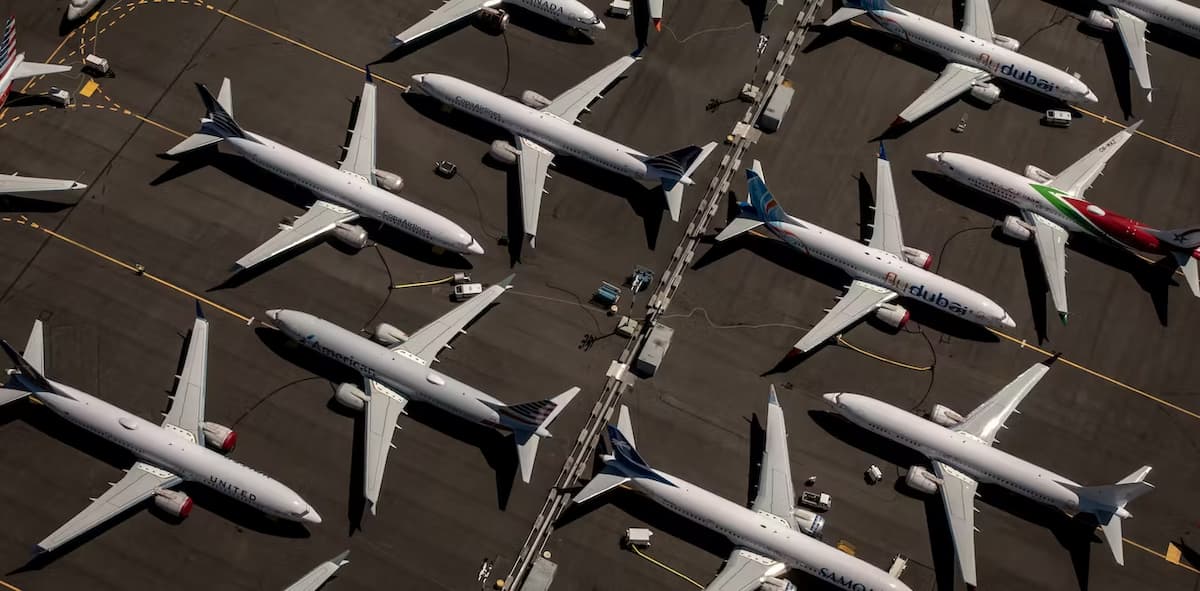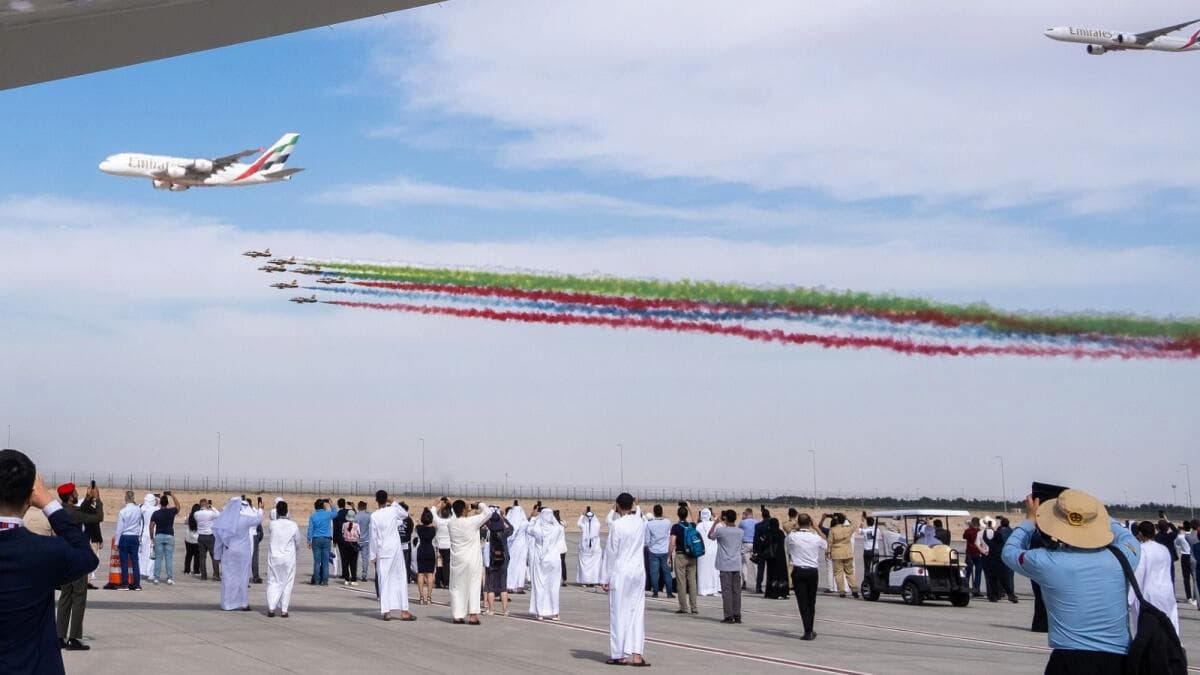The Dubai Airshow, a bellwether for the global aviation industry’s health, showcased the sector’s strong return to growth following the Covid-19 pandemic as airlines sealed multibillion-dollar deals for jets and signalled their confidence in the longevity of air travel demand.
The biennial global aerospace exhibition, which ended on Friday, was heaving with visitors throughout the week, as more than 115,000 people attended.
Global aircraft manufacturers secured deals, reconnected with customers at crowded chalets overlooking the DWC airport apron and expressed optimism about the continued growth of the industry.
This was all despite the headwinds of geopolitics, higher fuel prices, inflationary pressures, supply-chain bottlenecks and economic uncertainty – though these were also key topics of discussion at the industry event.
If the 2021 Dubai Airshow demonstrated signs of recovery from the pandemic, which brought the worst crisis in the industry’s history, then this year’s event highlighted its resilient return to sustainable growth.
Paul Griffiths, chief executive of Dubai Airports, summed up this sentiment at the Dubai Airshow gala dinner on Thursday night.
“We’re back!” he proclaimed to a gathering of the aviation industry’s elite, attended by Sheikh Ahmed bin Saeed, chairman and chief executive of Emirates Airline and Group.
“The emotional heart of this fabulous industry here in the UAE beats more strongly and more optimistically than ever before,” said Mr. Griffiths.
The Dubai Airshow’s host airline Emirates, along with its sister carrier flydubai, led the orders for commercial jets and underlined the recovery in the wide-body aircraft market, as long-haul travel makes a strong comeback.
Emirates ordered 110 aircraft worth $58 billion at list prices, while flydubai ordered 30 Boeing 787 Dreamliner wide-bodies valued at $11 billion. Customers typically get significant discounts, particularly for large orders.
Flydubai’s surprise order for 787s marks the first time it has introduced wide-bodies to its fleet.
The Dreamliners will give the airline the ability to reach markets beyond the range of its current all-Boeing fleet of 737 narrow-bodies.
“It gives us big opportunities,” airline chief executive Ghaith Al Ghaith told reporters.
“The airline is now nearly 15 years old, the 787 will be delivered in 2026 and by then we will be 18 years old.
“At that stage the airline would reach a point of maturity and we can grow in more markets.
“In terms of flight movements, we have great confidence.
“In our experience in flydubai, we flew to several points where we created demand to Dubai and people came. Dubai and the UAE are attractive markets and we have great confidence that any market we operate with the 787 will add positive value to Dubai and to the country.”
The two UAE carriers dominated the air expo with their order splash.
“The Dubai Airshow 2023 signifies a significant step in the aviation industry’s return to growth, following the initial recovery signals sent by the 2021 edition,” Linus Bauer, founder and managing director of Bauer Aviation Advisory, told The National.
“The 2023 show demonstrated a robust resurgence in industry confidence, marked by numerous high-value aircraft deals, cutting-edge technological showcases and a strong focus on sustainability and innovation.”
While the highlights were the deals by Emirates and flydubai, a “number of interesting orders from other airlines including Air Baltic and EgyptAir [gave] the show a broadly upbeat and optimistic tone”, said John Strickland, head of UK-based JLS Consulting.
The most significant deals
Boeing overtook its European rival Airbus with the biggest haul of aircraft orders at the Dubai Airshow this week, mainly due to its historically stronger portfolio of wide-body jets that are popular with major Gulf carriers such as Emirates, Etihad Airways and Qatar Airways.
The US plane maker surged ahead with firm orders for 214 aircraft including its 777X, 737 Max and 787 Dreamliners, with options for up to 83 additional jets.
While Emirates and flydubai made up the lion’s share of these deals, other Boeing customers at the airshow included SunExpress, Royal Jordanian, Royal Air Maroc, Scat Airlines, Ethiopian Airlines and EgyptAir.
“We believe that the volume of orders that have been placed with us this week is testament to the value that our airline partners put on Boeing’s advanced engineering and systems capabilities, and also a vote of confidence in our ability to deliver the [aircraft] that they require to serve their customers for decades to come,” Omar Arekat, Boeing’s vice president of commercial sales and marketing in the Middle East, told The National.
“The future of aviation is brighter than ever.”
Airbus, meanwhile, left the air show with firm orders for 66 aircraft including 15 A350-900s by Emirates, 11 A350-900s by Ethiopian Airlines, 10 A350-900s by EgyptAir and 30 A220-300s by Air Baltic.
The European plane maker secured the deal with Emirates for the A350-900s in the last minute on the penultimate day of the Dubai Airshow, three days after Boeing made big announcements at the opening of the expo.
The order came after differences between Emirates and engine-maker Rolls-Royce stood in the way of a deal for the larger A350-1000 model at the Dubai Airshow.
The airline was seeking guarantees from the UK manufacturer on the maintenance cost of the engines for the A350-1000 and their performance in harsh desert conditions.
Rolls-Royce’s Trent XWB-84 powers the smaller A350-900s, while the Trent XWB-97 engines powers the A350-1000s.
Meanwhile, General Electric’s aerospace unit said it won new orders for 454 engines during the Dubai Airshow. This includes Emirates order of 202 additional GE9X engines to power its 777X aircraft and 240 CFM LEAP engines for Air Arabia to power the carrier’s order of 120 Airbus A320neo family of aircraft ordered in 2019.
Source: The National News










